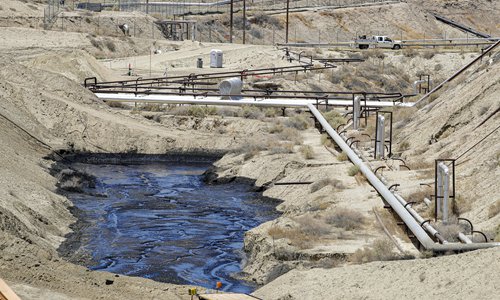COMMENTS / INSIDER'S EYE
Chevron $10b pain to look like peanuts as global warming hits

A crew works on seepage of more than 900,000 gallons of oil and brine water oil from an abandoned well at the Chevron Corps Cymric Oil Field that has transformed a dry creek bed into a black lagoon, on Thursday near McKittrick, California. Photo: VCG
America's big fossil-fuel companies are taking a simplistic approach to climate risk. Chevron on Tuesday followed ConocoPhillips' lead from last month in emphasizing shorter-term, less capital-intensive and, it hopes, higher-return assets. That may reduce the financial pain that will come from longer-term projects becoming uneconomic - or stranded, in finance-speak - as global warming hits. Even so, what lies ahead will make Chevron's $10 billion writedown of gas assets on Tuesday look like peanuts.Even if Chief Executive Mike Wirth surprised shareholders with the timing of the writedown, they have had ample chance to prepare for it. Natural-gas prices have been falling of late, making it harder for even the most efficient of players to turn a profit.
And the Marcellus basin in the Appalachia, which accounts for more than half of the medicine Chevron is taking, pales in significance next to the oil and gas riches in the Permian basin in Texas.
In fact, Wirth and his fellow executives mentioned the region just a handful of times over the past three years, a search of public investor events shows. And Chevron's $33 billion offer for Anadarko in April would have made it even less important. His merger partner, which ultimately jilted him for a better offer for Occidental Petroleum, had sold its own business in the region three years earlier.
Appalachia represents only 14 percent of Chevron's US assets, and just 5 percent of its global total. Cutting them off is therefore relatively easy for the $223 billion company to do.
That leaves a huge balance of business exposed to a different kind of risk: that of shareholders, regulators, policymakers and end-users rapidly changing their approach to pricing and mitigating climate risk. Taking just a $10 billion charge could one day feel like a happy memory.
The author is Antony Currie, Reuters Breakingviews columnist. The article was first published on Reuters Breakingviews. bizopinion@globaltimes.com.cn
